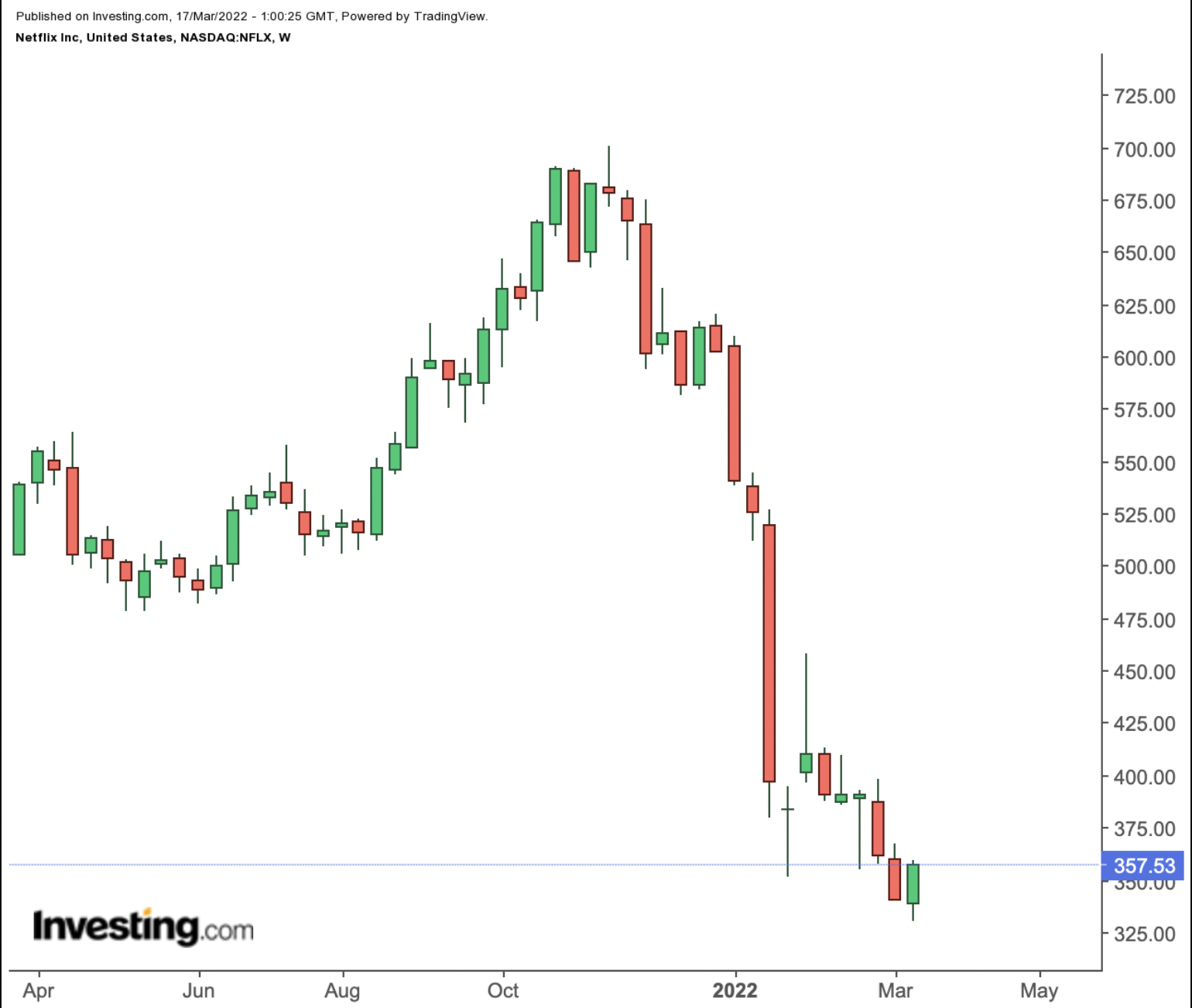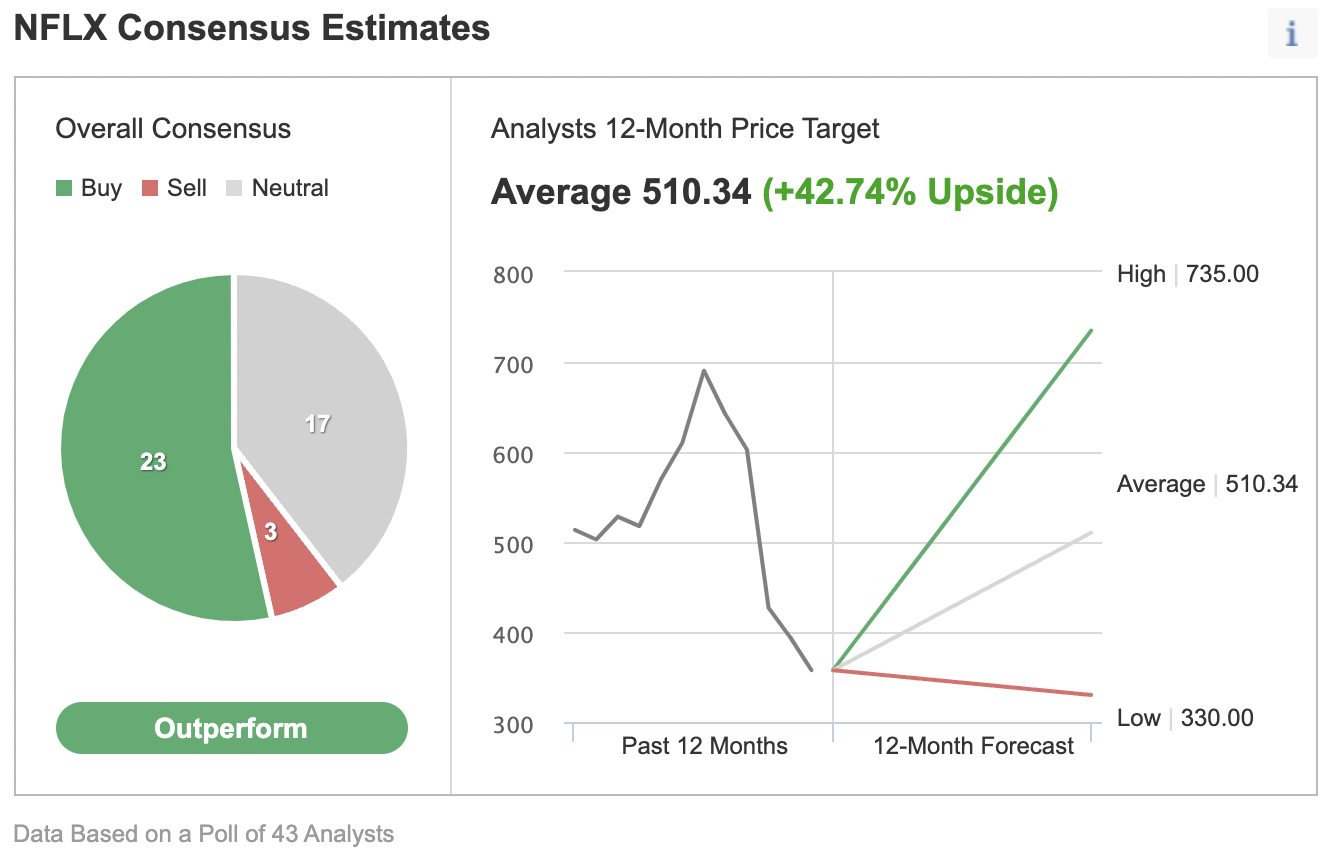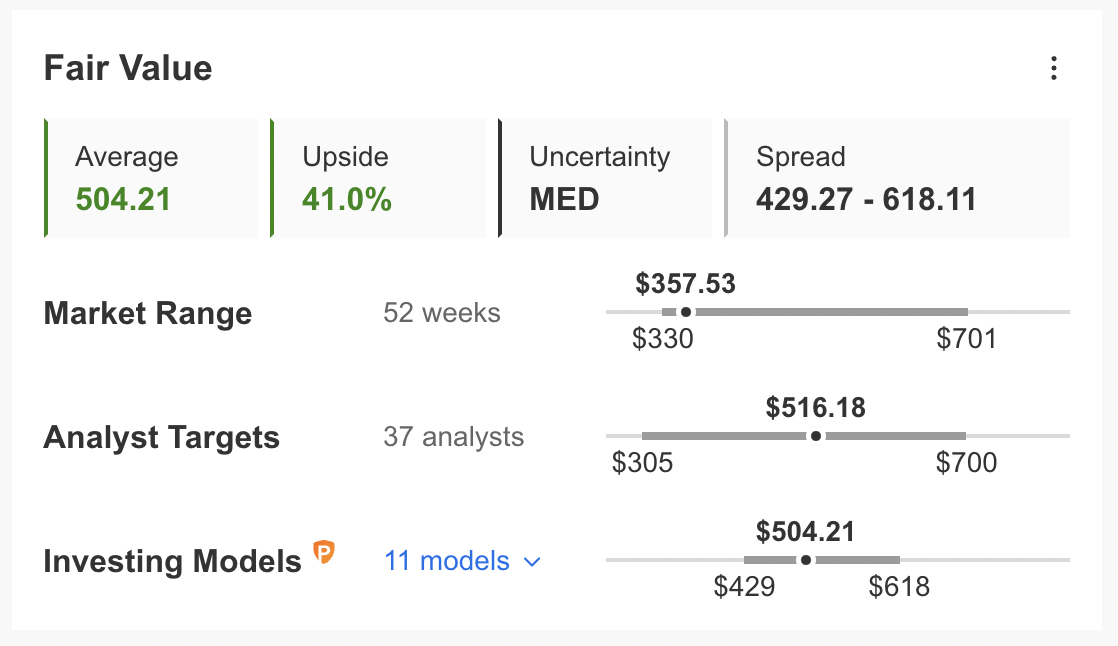- Shares of online streaming and entertainment heavyweight Netflix dropped more than 41% since the beginning of 2022
- Net subscriber guidance for Q1 was soft, creating headwinds for NFLX stock
- Long-term investors could consider buying NFLX shares at current levels
Shares of the streaming entertainment pioneer Netflix (NASDAQ:NFLX) are down more than 41.3% year-to-date, and around 32.5% in the past 12 months. In comparison, since January, the Dow Jones U.S. Media Index and the Roundhill Streaming Services & Technology ETF (NYSE:SUBZ) have declined 11.6% and 24.8%, respectively.

On Nov.17, 2021, NFLX shares went above $700 to hit a record high. But since then, Netflix shares have come under significant pressure. The stock’s 52-week range has been $329.82-$700.99, while the company’s market capitalization stands at $156.7 billion.
Recent metrics suggest global subscription video-on-demand (SVOD) “will increase by 491 million between 2021 and 2026 to reach 1.64 billion. China and the U.S. will account for 49% of the global total by 2026, down from 56% in 2021.”
Meanwhile, Netflix is the leading SVOD provider in the U.S. Amazon's (NASDAQ:AMZN) Prime Video service is next, followed by Walt Disney's (NYSE:DIS) Disney+.
Netflix released Q4 financials on Jan. 20. Revenue was $7.7 billion, up 16% year-over-year. The number of subscribers increased by 8.9%, reaching 221.84 million.
Net subscriber additions, which was 8.28 million, fell short of the earlier guidance of 8.5 million. Diluted EPS was $1.33 compared with $1.19 of Q4 2020.
In its letter to shareholders, NFLX management stated:
“Full year revenue of $30 billion grew 19% year over year while operating income of $6.2 billion rose 35% year over year. Overall in 2021, Netflix series accounted for six out of the 10 most searched shows globally, while our films represented two of the top 10.”
The company expects to achieve 2.5 million global streaming paid net additions in Q1 2022. While revenue is forecast to hit $7.9 billion, diluted EPS guidance was given as $2.86.
Prior to the release of the Q4 results, Netflix stock was around $510. But as of Wednesday's close, the share price was $357.53. This means NFLX shares have lost more than 30% since the January earnings announcement.
What To Expect From Netflix Stock
Among 43 analysts polled via Investing.com, NFLX stock has an "outperform" rating.

Source: Investing.com
Wall Street also has a 12-month median price target of $510.34 for the stock, implying an increase of more than 45% from current levels. The 12-month price range currently stands between $330 and $735.
Similarly, according to a number of valuation models, like those that might consider P/E or P/S multiples or terminal values, the average fair value for Netflix stock at InvestingPro stands at $504.21.

Source: InvestingPro
In other words, fundamental valuation suggests shares could increase about 41%.
We can also look at Netflix’s financial health as determined by ranking more than 100 factors against peers in the communication services sector.
For instance, in terms of growth and profit, it scores 4 out of 5. Its overall score of 3 points is a good performance ranking.
At present, NFLX’s trailing P/E, P/B and P/S ratios are 30.6x, 9.9x and 5.3x respectively. Comparable metrics for peers stand at 3.7x, 3.2x and 4.8x respectively. These numbers show that despite the recent decline in price, the fundamental valuation for NFLX stock is still on the rich side.
Meanwhile, trailing P/E, P/B and P/S ratios for Amazon are 46.0x, 11.1x. and 3.3x respectively. Finally, Disney’s metrics stand at 79.2x, 2.8x and 3.4x respectively.
Our expectation is for Netflix stock to build a base between $340 and $360 in the coming weeks. Afterwards, shares could potentially start a new leg higher.
Adding NFLX Stock To Portfolios
Netflix bulls who are not concerned about short-term volatility could consider investing now. Their target price would be $504.21, as suggested by fundamental valuation models.
Alternatively, investors could consider buying an exchange-traded fund (ETF) that has NFLX stock as a holding. Examples include:
- Roundhill Streaming Services & Technology ETF (NYSE:SUBZ)
- Invesco NASDAQ Internet ETF (NASDAQ:PNQI)
- iShares Evolved U.S. Media and Entertainment ETF (NYSE:IEME)
- First Trust Dow Jones Internet Index Fund (NYSE:FDN)
- Pacer BioThreat Strategy ETF (NYSE:VIRS)
Finally, investors who expect Netflix stock to bounce back in the weeks ahead could consider setting up a bull call spread.
Most option strategies are not suitable for all retail investors. Therefore, the following discussion on NFLX stock is offered for educational purposes and not as an actual strategy to be followed by the average retail investor.
Bull Call Spread On Netflix Stock
Intraday Price At Time Of Writing: $351.40
In a bull call spread, a trader has a long call with a lower strike price and a short call with a higher strike price. Both legs of the trade have the same underlying stock (i.e., Netflix) and the same expiration date.
The trader wants NFLX stock to increase in price. In a bull call spread, both the potential profit and the potential loss levels are limited. The trade is established for a net cost (or net debit), which represents the maximum loss.
Today’s bull call spread trade involves buying the June 17 expiry 360 strike call for $28.50 and selling the 370 strike call for $24.10.
Buying this call spread costs the investor around $4.40, or $440 per contract, which is also the maximum risk for this trade.
We should note that the trader could easily lose this amount if the position is held to expiry and both legs expire worthless, i.e., if the NFLX stock price at expiration is below the strike price of the long call (or $360 in our example).
To calculate the maximum potential gain, we can subtract the premium paid from the spread between the two strikes, and multiply the result by 100. In other words: ($10 – $4.40) x 100 = $560.
The trader will realize this maximum profit if the Netflix stock price is at or above the strike price of the short call (higher strike) at expiration (or $370 in our example).
Bottom Line
In recent months, Netflix stock has come under significant pressure. Yet, the decline has improved the margin of safety for buy-and-hold investors who could consider investing in the streaming giant soon. Alternatively, experienced traders could also set up an options trade to benefit from a potential run-up in the price of NFLX stock.
